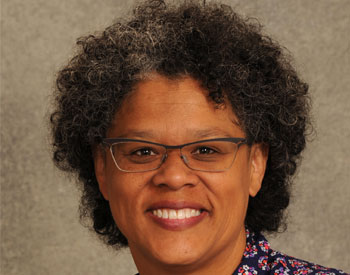3 Questions for Kim Pierce, first African-American to graduate from Doctor of Nursing Program
Dana Brandorff | College of Nursing Feb 19, 2019
1. Tell me about your career today
My current position is as a Senior Instructor, School of Medicine, Department of Infectious Disease, at the CHIP Clinic (Children’s Immunodeficiency Program). I’m a Pediatric Nurse Practitioner caring for children and youth living with HIV. The CHIP Clinic is housed at Children’s and I’ve been with this program for 6 years this coming March.
2. Have you always had an interest in children with HIV?
I’ve always enjoyed working with adolescents, especially marginalized youth (LGTBQ, youth of color). I started my career working as a PNP in primary care, which I loved. But I always especially enjoyed working with youth. Over time, I found that I had a knack for creating a safe, non-judgmental space for youth to share their lives with me. I am humbled that I can be a part of their growth and development as they navigate a very complex world. It feels good to know that I can be a part of their journey as they mature. So many marginalized youth feel alone and invisible. I work hard to help them see that they are not alone and that they have a voice and a story that is valuable and uniquely their own. I want them to understand the value of self-acceptance and overall wellness.
3. Can you tell me about your experience at the CU College of Nursing and how those skills learned help in your profession today?
Looking back, I link many of my current skills to my education at CU Nursing. I had a very well rounded experience. Not only did I receive an excellent clinical education but the curriculum also included an education in non-Western medicine and healing practices, alternative and complimentary therapies, Caring Science and an emphasis on cultural competency. All of this has served me well in my work with marginalized youth. Also my own life experience as a woman of color. I spent much of my early life being the only person of color in the room. Over time you tend to see yourself as not belonging and it can feel lonely. I think many people in these situations tend to internalize their sense of “otherness” as they navigate the world. As I work with youth living with HIV, all these experiences and skills come together and it is tremendously satisfying to know that I may be making a small difference in the lives of the youth I serve. There is still so much stigma and misinformation surrounding HIV. My work at CHIP has been very rewarding. I work with so many incredible people who are committed to the full spectrum of HIV care; education, research, prevention, mental health, wellness, advocacy and clinical care. We all take pride in knowing we are making a difference in the lives of others.